Official opposition leader McHenry Venaani said jobs can only be created from a robust agricultural sector. “We need to spend money in the agricultural sector. If we look at the budget of the agricultural sector, they are spending less than 2,7% of our GDP on agriculture, which is failing job-creation. The biggest problem in this country is job-creation.”
“As such, the need to cultivate a conducive environment to support economic activities and encourage the development of nascent industries remains very urgent,” he said.
“We should carefully balance between our very real, very urgent, and very large spending requirements and putting something aside to leave a better country to the future generations,” he said.
Shiimi cautioned to safeguard the fiscal gains the government has made over the past few years by utilising the window of opportunity presented by the strengthening economic activities to rebuild their fiscal buffers and spend our resources sparingly.
Join The Namibian’s budget live-stream here: https://www.facebook.com/TheNamibianNewspaper/videos/1092060861941586
Shiimi said the stable economic platform allowed the government room to channel resources to provide for the most urgent needs in the social sectors, increase outlays towards investments in infrastructure while providing some relief to households and corporates alike.
“Furthermore, we maintained a careful balance to ensure that we can meet our upcoming debt obligations as we persist with the fiscal sustainability imperative,” he said.
The Electoral Commission of Namibia (ECN) has been allocated a total of N$438,0 million.
The Justice ministry receives N$674,3 million, Ministry of Urban and Rural Development to get N$2,6 billion as well as Office of the Prime Minister will remain steady at N$1,1 billion with provisions to the tune of N$700 million has been made to cater for drought relief in the event the 2024 rain season disappoints.
The Anti-Corruption Commission has been allocated N$106,0 million, Home Affairs, Immigration, Safety and Security receives N$7,4 billion and the Judiciary has been allocated N$445,5 million.
“Accordingly, we have distributed the corresponding information regarding the utilisation of the Contingency Fund during the current financial year. In addition, a total of N$250 million is provided for in the Contingency Fund to cater for unforeseen emergencies in FY2024/25,” Shiimi said.
A total of N$481,1 million was allocated to the Contingency Fund and all the funds therein are fully committed.
“A total of N$212,0 million has been budgeted for the Meat Corporation of Namibia (MeatCo), inclusive of the settlement of their contingent liabilities. Meanwhile, N$300 million has been provided for TransNamib to support their day-to-day operations cognizant of significant infrastructure and operational challenges. N$88 million has been allocated for the completion of the Luderitz Waterfront project. Furthermore, we have availed N$77,0 million to Agribank for a dedicated subsidy program to support farmers whose operations have been adversely affected by drought conditions,” he said.
Shiimi’s Ministry of Finance and Public Enterprises has been allocated a budget of N$8.1 billion for Public Servants Medical Aid Scheme (PSEMAS) and more than N$700 million in transfers to public enterprises.
Shiimi allocated N$725,5 million to the Ministry of Environment, Forestry and Tourism. “The increased allocations should allow the ministry to attend to infrastructural deficiencies given the increased volumes of tourist arrivals as well as to improve the overall marketing of Namibia as a tourism hub,” he said.
“The increased allocation is meant to improve capacity at the ministry, especially in the Petroleum Affairs Directorate in light of the upsurge in exploration activities in the Orange basin. Furthermore, the development budget of the ministry has more than doubled, with N$131,0 million availed to fast-track rural electrification and improve access to electricity countrywide,” Shiimi said.
The Ministry of Mines and Energy has increased by more than 50 percent to N$381,9 million in FY2024/25 and some N$1,5 billion over the MTEF.
“In this context, funding has been allocated to the Equipment Aid Scheme, Start-Up Namibia and EMPRETEC Namibia to facilitate domestic trade activities and build domestic entrepreneurship capacity especially for SMEs,” he said.
The Ministry of Industrialisation and Trade received N$365,5 million in support of SMEs and domestic economic activities.
“In addition to fast-tracking the upgrading of the railway network, this allocation also caters for N$1,8 billion for the completion of ongoing road construction projects,” he said.
The Agriculture and Land Reform budget is a total of N$1,9 billion.
“This includes N$50 million dedicated for land purchase to address the plight of generational farm workers as well as N$87 million for the improvement of animal health and marketing in communal areas. Provisions have also been made for improving food systems as well as the Green Scheme programme including Phase II of the Neckartal Dam Irrigation Project, among others,” he announced.
The transport allocation is N$5,1 billion, including N$1,9 billion in project financed through external loans and grants.
“Inclusive of projects funded through external loans, has been allocated to the sector ministries responsible for carrying out the construction of infrastructure and implementation of economic policies,” he said.
Shiimi said to address the slow infrastructure development, a total of N$20,9 billion in FY2024/25 and some N$58,9 billion over the MTEF.
“Within that allocation, we have availed more than N$450 million in the development budget including for commencing with earthworks at the Windhoek District Hospital in Havana, the expansion of primary health care centres and clinics countrywide and improving the capacity of referral hospital services. Further consideration has been made to cater for the recruitment of medical personnel as well as acquisition of pharmaceuticals and medical equipment,” he said.
The Ministry of Health and Social Services will receive N$10,9 billion and a sum of N$34,3 billion over the MTEF.
“The additional allocation includes N$200 million to the Namibia Student Financial Assistance Fund (NSFAF), bringing their total allocation to N$2,3 billion and a total of N$7,1 billion over the MTEF. Furthermore, we have provided N$108,3 million for a 5,0 percent salary increment for Unam staff,” he said.
Shiimi said the higher education ministry has been allocated N$4.8 billion in FY2024/25, 13,0 percent higher than the preceding year.
“This includes N$29,5 million for preparatory activities to enable us to host the Region 5 Youth Games in May 2025. In addition, N$124 million has been provided in the development budget for, among other, upgrading of the Independence Stadium as well as various sports facilities and multipurpose youth centres across the country,” he said.
Shiimi said sport’s operational budget promotion programmes get an additional N$100 million.
“The allocation caters for, among others, skills development courses for out-of-school youth (N$20 million), youth training through the charcoal and mushroom production programmes (N$12 million), funding for the youth credit scheme (N$10 million), financing for 121 youth enterprises across all constituencies (N$9,8 million) and youth skills development through the National Youth Service (N$20 million),” he said.
Shiimi said youth and national service has increased by 45,3 percent to N$679,4 million in FY2024/25 and a total of N$2,2 billion over the MTEF period.
“Over the MTEF, the vote will absorb N$24,5 billion,” he said.
Shiimi said they have made provision to increase the frequency of food distribution to marginalised communities at a cost of N$170,0 million, and N$284,5 million to ensure full coverage of the orphan and vulnerable children grant.
“Accordingly, the old age grant and the disability grant will be increased from N$1 400 to N$1 600 per month effective on 01 April 2024. We fully recognise the dream of our departed president for a significant increase in the old age grant, but we cannot afford to deliver on his dream in a single financial year,” he said.
The Ministry of Gender, Poverty Eradication and Social Welfare has increased by 23,2 percent to N$8,0 billion.
The Ministry of Education, Arts and Culture gets N$18,4 billion
Sin tax update taking effect on 22 February 2024:
- • 340 ml can of beer increases by 10c
- • 750 ml bottle of wine goes up by 18c
- • 750 ml bottle of spirits will increase by N$3,90
- • 23 gram cigar goes up by N$5,47 and
- • pack of 20 cigarettes, the duty rises by 98 cents
“Accordingly, the exempt level will be lifted from N$600 000 to N$1,1 million. Moreover, the threshold to trigger the transfer duty rate of 8 percent will be increased to N$3,15 million effective in FY2024/25,” he said.
In an effort to support improving access to housing, the brackets for transfer duties and stamp duties will be adjusted for inflation.
“In this regard, a capital depreciation allowance of 10 percent each year will be applicable on the costs of buildings erected, added to, extended or improved and which are used for trade purposes,” he said.
Shiimi proposes building improvement deductions to address the issue of urban decay within inner cities and to maintain existing infrastructure while encouraging investments.
Shiimi hopes that these reforms will yield additional taxes of more than N$600 million per year.
The minister plans to amend the law to remove nonresident shareholder tax exemption for foreign insurance company shareholders and provide for taxation of shareholders activities like other businesses.
“This change takes effect in FY2024/25 and is projected to yield additional revenue of N$180 million per year,” he said.
“Nonetheless, to maintain tax neutrality, this reduction will be undertaken alongside broadening the corporate income tax base by: replacing the 3:1 thin capitalisation ratio with a 30 percent limit on interest deductions; capping assessed losses carried forward at five years for normal companies and 10 years for companies operating in the natural resources sectors; and introducing a 10 percent dividend tax effective on 1 January 2026 to address the existing disparity in the investment arena where dividends paid to non-resident shareholders is subject to tax,” Shiimi explained.
Shiimi said corporate income taxes, the non mining company tax rate will be reduced further to 28% during FY2026/27.
Shiimi said non-mining company tax rate will be reduced by 2% points during the MTEF.
“Accordingly, the tax rate will be reduced to 31 percent effective on 01 January 2024, with a further reduction to 30 percent taking effect on 01 January 2025,” he said
He said a total of N$712,9 million per annum in direct relief to taxpayers has been provided. “We have made provisions in the two outer years of the MTEF to adjust all tax brackets for inflation creep,” Shiimi said.
He said the government will increase the threshold for income tax on individuals from the current N$50 000 to N$100 000.
“This action will result in an injection of N$646,0 million directly into the pockets of taxpayers. Effectively, all individual taxpayers will be exempted from paying tax on the first N$100 000 of their income as from 01 March 2024. In this respect, the revised tax tables will be published accordingly,” he said.
Old-age pension increased to N$1 600 per month
“The beneficiary projects include the refurbishment of the Oshakati and Rundu Water Treatment Plants as well as the development of the second Ohangwena Aquifer Well Field. “In addition, funding has been availed for drilling of boreholes, expansion of pipelines and various rural water supply projects to improve access to water within communities, especially considering the increased drought incidences,” he said.
Shiimi said they have set aside N$2,2 billion in FY2024/25 including N$1,1 billion in loan funded projects to address the country’s water needs.
To address the country’s energy supply shortages in the region, N$200 million in the the financial year 2024/25 and N$200 million in the financial year 2025/26 has been made to support NamPower in funding the development of the 40MW Otjikoto Biomass Power Station.
To implement the National Housing Policy, the government will allocated a total of N$700 million to the informal settlements upgrading, massive land servicing and other programmes to improve access to housing opportunities nationwide.
“The allocation reflects our recognition of the urgency to close the infrastructure gap in the education sector and reduce stark inequalities in access to social infrastructures especially for the rural and low-income communities,” he said.
The government will give N$970 million to the Ministry of Education, Arts and Culture to cater for the construction and renovation of classrooms and other school infrastructures.
“In this context, critical sections of the national railway line are in a state of disrepair and will thus enjoy attention from a funding perspective over the MTEF. In this regard, a total of N$6.6 billion is earmarked for the railway network development over the MTEF. These allocations are further complemented by operational funding, a dedicated loan facility to purchase rolling stock as well as ongoing efforts to improve governance at TransNamib,” he explained.
Shiimi said N$2,5 billion will go towards railway infrastructures, consisting mainly of N$1,9 billion for the upgrading of the Kranzberg-Otjiwarongo railway section and N$488 million for the rehabilitation of the Sandverhaar-Buchholzbrunn railway section in the south.
“As customary, the detailed borrowing plan for the issuance of domestic securities will be disseminated to market participants before the commencement of the new financial year,” he told parliament.
Shiimi said the government will employ a combination of domestic debt instruments and funding from multilateral organisations for ongoing infrastructure projects in the road, water, and railway sectors.
“Therefore, the fiscal framework provides for specific measures to maintain public debt on a reduction path and ensure that debt is raised in the most cost-effective manner,” he said.
The government has put aside N$12,8 billion to meet debt servicing obligations in the 2024/25 financial year, equivalent to 14,2 percent of revenues and 4,7 percent of GDP.
Shiimi expressed concerned about limited project execution capacity at most Offices/Ministries/Agencies (O/M/As) and procurement bottlenecks which continually translate into virementation of funds from and/or underspending on the development budget. “Accordingly, the government will continue to work on addressing these shortcomings,” Shiimi said.
“This is inclusive of N$3,2 billion in grant-funded and loan-funded projects to improve infrastructure through various ministries,” Shiimi said.
The government wants to close the infrastructure gaps by continuing to weigh against our growth potential, the development budget has been increased significantly by 58,1 percent to N$12,7 billion.
“I would like to emphasise that this is an exceptional once-off exercise to clear the legacy debt of public enterprises accumulated prior to the establishment of NamRA. This action is undertaken to enable NamRA to apply the law to all taxpayers equally. Should any public enterprise accumulate tax liabilities going forward, the Treasury is not prepared to offer any support,” he said.
Shiimi said the injection into these SOEs are undertaken on the back of agreed conditions including regular publication of audited financial statements and commitment to meet future tax liabilities henceforth.
He thanked civil servants for being patient and waiting for this increase.
The operational budget includes N$1,4 billion in once-off legacy tax liabilities of selected public enterprises.
“This includes those enterprises whose funding was severely reduced due to fiscal consolidation in previous years,” he said.
He named these enterprises: the University of Namibia (Unam), TransNamib, the
Namibia Broadcasting Corporation (NBC), the New Era Corporation, the National Fishing Corporation of Namibia (FishCor) and the Roads Contractors Company (RCC).
The minister said the operational budget is estimated at N$74,6 billion, representing an increase of 8,8%. He announced that civil servants will get a 5% increase. “The increase in operational expenditure largely reflects the 5,0% adjustment in the civil service wage bill at a cost of N$1,7 billion to guard against the erosion of purchasing power,” he said.
Shiimi said over the MTEF period, revenue growth is projected to average 5,0 percent reaching N$93,6 billion by the end of the financial year 2026/27.
“In the outer years, the revenue projections incorporated cautious estimates of SACU receipts as well as a moderate increase in domestic revenues aligned to our positive growth expectations,” he said.
Shiimi tabled a budget of N$100,1 billion.
“This total expenditure includes N$3.2 billion in development projects funded through external loans and grants as well as N$12,8 billion in interest payments. On balance, the total budget has increased by 12.4 percent from the revised estimates of the preceding year,” he said.
Shiimi said the revenue estimates for this financial year 2024/25 include expected dividends of N$1,2 billion following the anticipated dissolution of the Namibia Post and Telecom Holdings Company (NPTH) during the financial year. “An additional N$500 million is expected from the sale of the remaining 9,0% shares in the Mobile Telecommunication Company (MTC). Further dividends are expected from other public enterprises, notably, the Bank of Namibia, Namibia Desert Diamonds (NamDia), and the Namibia Port Authority (NamPort),” he said.
The minister estimated total revenues of N$90,4 billion for the 2024/25 financial year, an increase of 11,5% from the revised estimates of the previous year.
“The substantial boost to revenues stem from a positive adjustment in SACU receipts, which is estimated at N$28,0 billion, significantly better than our initial projections,” he said.
Shiimi said several domestic revenue streams have also been revised upwards.
“In this context, income tax on individuals is estimated to increase by N$1,3 billion over the revised estimates of FY2023/24, VAT is estimated to increase by N$1,7 billion while non-mining company taxes are estimated to increase by N$759,4 million over the same period,” he explained.
“As a result, there has been significant underinvestment in critical infrastructure,” he said.
“Consequently, the remaining one-third of the bond (US$250 million) will be refinanced utilising the most cost-effective instrument in the next financial year, cognisant of the prevailing high interest rate environment and the need to manage debt servicing costs,” Shiimi said.
Shiimi reported that the past years of difficult economic conditions have culminated
in a slowed pace of public investments as evidenced in a persistently small and falling development budget.
In addition to this plan, the government will transmit at least N$3,5 billion during financial year 2024/25 and some N$2 billion in financial year 2025/26 of the SACU receipts to the sinking fund to place us in a position to retire two-thirds of the Eurobond (US$500 million) at maturity.
“This will ensure that we minimise a potentially significant future drain on resources that are desperately needed for infrastructure development, poverty reduction and combating climate change, among others,” he said.
Shiimi said a significant portion of the government debt portfolio is due for repayment over the MTEF. “The largest among these maturities is the US$750 million (N$14,3 billion) Eurobond due on 29 October 2025. This is the largest single day debt maturity in the history of our country,” he said. To address this, the government will redirect part of the increase in revenues towards the sinking fund to manage the rollover risk and contain increases in future debt service obligations.
Shiimi asserted that government cannot achieve sustainable job creation without the support of private businesses, including Small and Medium Enterprises (SMEs).
“As such, the fiscal framework considered the requisite interventions to create a conducive operating environment to enable the private sector to expand domestic investments,” he said.
The minister said public debt growth has stabilised, and the debt metrics have started declining. “Despite this, it remains crucial for the fiscal framework to maintain a primary budget surplus over the upcoming midterm expenditure framework to contain the pace of debt accumulation,” he said. He said the budget deficit is expected to improve to 3,2 percent, the initial estimates of 4,2 percent at midterm and in the main budget last year.
Shiimi told parliament that 92% of the budget was spent by the end of January 2024.
“Cognisant of potential overspending, interest payments are revised upwards marginally by N$78.4 million,” he said.
The minister said they have secured N$10,4 billion equivalent to 80,4% of the total funding requirement, which was secured over the same period.
“Consequently, the total debt stock stood at N$151,3 billion, equivalent to 61,3 percent of gross domestic product,” he said.
Shiimi said in the operational budget, an execution rate of 73,6% was recorded over the period, while the implementation rate on the development budget stood at 64,5%. “The spending rate is below historical levels for this time of the year. As a result, we do not anticipate significant expenditure overruns by the end of the financial year,” he added.
“The preliminary out-turn at the end of January 2024 stood at N$54,1 billion. This is equivalent to 70,7% of the revised expenditure numbers presented in the financial year 2023/24 mid-year budget review,” he said.
“The dividends underperformed primarily due to a significant decline in global diamond prices over the period, which has adversely affected the financial performance of the NamDeb Group over the medium term,” Shiimi said.
Through the government’s tax amnesty programme between April 2023 and January 2024, a total of N$2,5 billion has been collected in various tax categories.
“We have noted particularly strong collections in the revenue categories of corporate income tax with a collection rate of 109,6%, value-added
tax, which recorded an 89,7% collection rate as well as withholding tax on services and tax on royalties, which both stood at 130% of estimated revenue over the period,” he said.
The government collected N$72 billion revenue, which is a collection rate of 90,6% over the first 10 months of the financial year. “This is significantly higher than the corresponding historical average,” he said.
“In this context, revenue collections stood at N$72 billion, translating into a collection rate of 90,6% over the first 10 months of the financial year. This is significantly higher than the corresponding historical average,” he said.
“This exercise subsequently shifted the global expenditure ceiling for the financial year 2023/24 upwards to N$89 billion,” he said.
Shiimi said initial indicators at the end of January 2024, show strong and improving fiscal fundamentals, driven by strong revenue growth due to an improved tax administration as well as domestic economic recovery.
Shiimi announced that there is an additional operational budget of N$2,5 billion along with some N$2,3 billion for interest payments.
“Similarly, the latest data prints for January 2024 showed a continued downward trend in prices with an annual inflation rate of 5,4%,” he said.
Shiimi believes that over time, the inflationary pressures are expected to subside.
“Although the speed of moderation remains largely dependent on the performance of the exchange rate and global commodity price developments, among others,” he said.
Shiimi told the National Assembly that the domestic prices moderated to an average of 5,9% in 2023, in contrast to the 6,1% recorded in 2022.
The conducive environment will facilitate a faster emergence of new engines of growth, especially in sectors with potential to create high-quality jobs, Shiimi explained.
Shiimi warned that there is an urgency to diversify the economy. “This would require government to create a conducive environment by addressing the identified binding constraints to growth and addressing existing policy coordination barriers,” he said.
The main factor for the positive outlook is the mining sector. “The strong economic activities largely reflect recovery in the traditional engines of domestic growth, particularly the mining sector which is highly capital intensive,” Shiimi said.
“In addition, sentiments have also broadly improved across many other sectors
of the economy, such as tourism, transport and storage, financial services,
and electricity generation,” Shiimi said.
This he attributed to the strong growth increased activities in the natural resources sector, including the residual impact of ongoing petroleum exploration on domestic economic activities and the surge in uranium production following price increases.
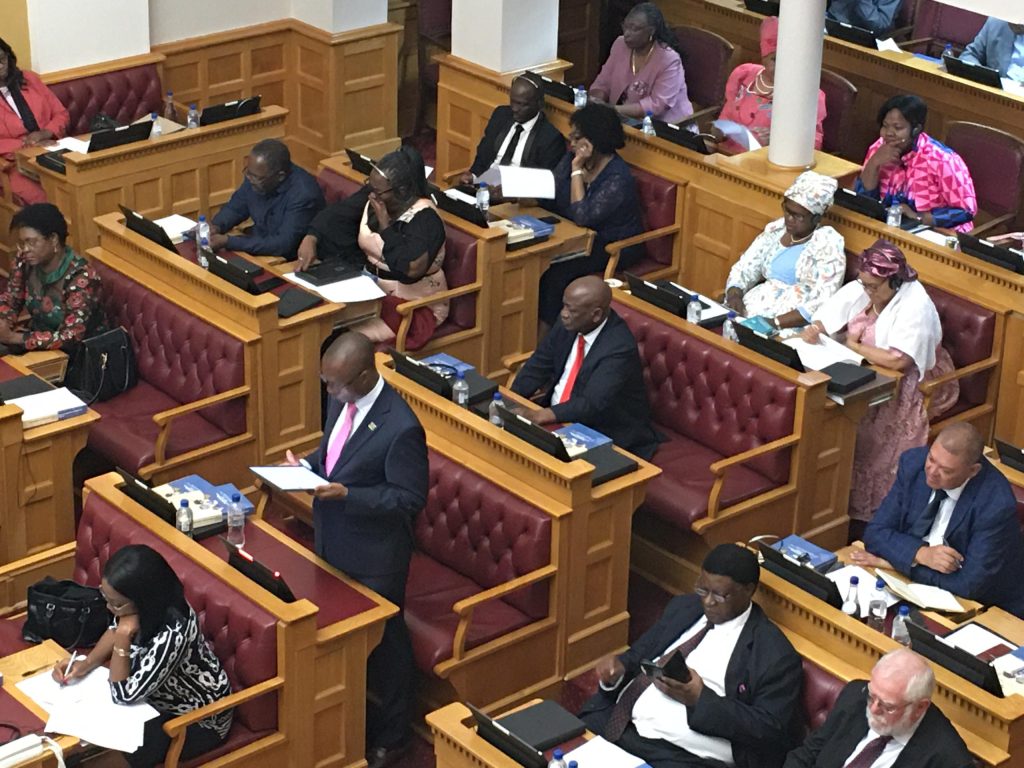
Shiimi said Namibia’s outlook has largely improved as stated by the Namibia Statistics Agency.
“In this regard, we estimate GDP growth at 5,6%in 2023 before moderating to 4% in 2024 and 3,9% in 2025,” he said.
“Nevertheless, on the upside, falling international commodity prices translate into reduced domestic price pressures, going forward,” she said.
The minister said for Namibia’s economy, muted commodity prices present a significant risk for domestic production and export earnings, particularly for the diamond subsector.
“On the commodity prices front, international fuel and non-fuel commodity prices are projected to trend downwards during 2024, in line with subdued global demand,” he said.
Shiimi said the global growth remains below the historical average, weighed down by elevated interest rates to curb inflationary pressures, low productivity, as well as limited fiscal support due to high debt levels.
Shiimi said the government is supporting schools and developing them for the pupils.
The minister recounts his visits to three Windhoek schools, namely Mix Primary School, Augustineum Secondary School and Havana High School where renovations were done.
Shiimi said Augustinum Secondary School is intertwined with the late president Hage Geingob and during his visit there he saw that tax money is working in the community after its renovation.
“At Havana High School I was joined by my team and Namra. Staff members gave us a brief history,” he said.
Shiimi learned during this briefing that the school was filled with tents a few years back.
“At Havana [school] you can see government funds put to good use,” he said.
Shiimi said during his visit to Havana High School he saw a multitude of pupils walking to school.
Finance minister Iipumbu Shiimi says they are continuing the legacy of president Hage Geigob by caring for the Namibian child.
McHenry Venaani, the leader of the official opposition, questions the minister of mines and energy about allegations that Hyphen Hydrogen Energy, the preferred bidder to set up the country’s largest green hydrogen project at Lüderitz, has not been able to acquire the required funds to get the project off the ground.
UDF MP Dudu Murorua questioned his fellow parliamentarians on where they went wrong for Namibia to be greylisted by the Financial Action Task Force (FATF) . “We spent over N$20 million for the investment conference last year. Namibia is supposed to have an African hydrogen summit,” he said. Murorua questions Namibia’s economic prospects at all the conferences and summits held as well as whether they bring in money for the country. “The expression is out of context,” Shiimi responded. He said he will provide a response to Murorua at a later stage.
Shiimi was accompanied to parliament by pupils today.
“It’s all about supporting the Namibian child. We are also making provision to ramp up our investment in infrastructure and taxpayers and be able to give them some relief because inflation has been increasing,” Shiimi said.
Finance minister Iipumbu Shiimi says he is looking at how they can support the economy and ensure that they provide resources to the needy sectors such as education and health, but particularly education.
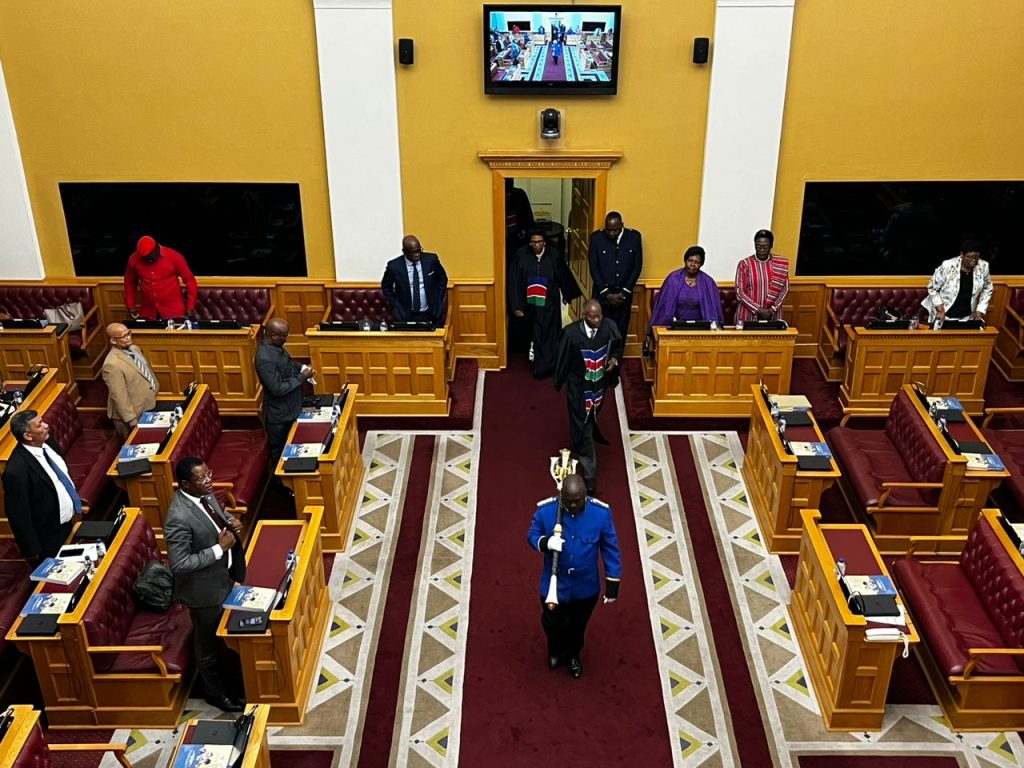
PARLIAMENT … The speaker of parliament, Peter Katjavivi, has arrived in the parliament chamber for the tabling of the national budget for 2024/25. Photo: Shania Lazarus
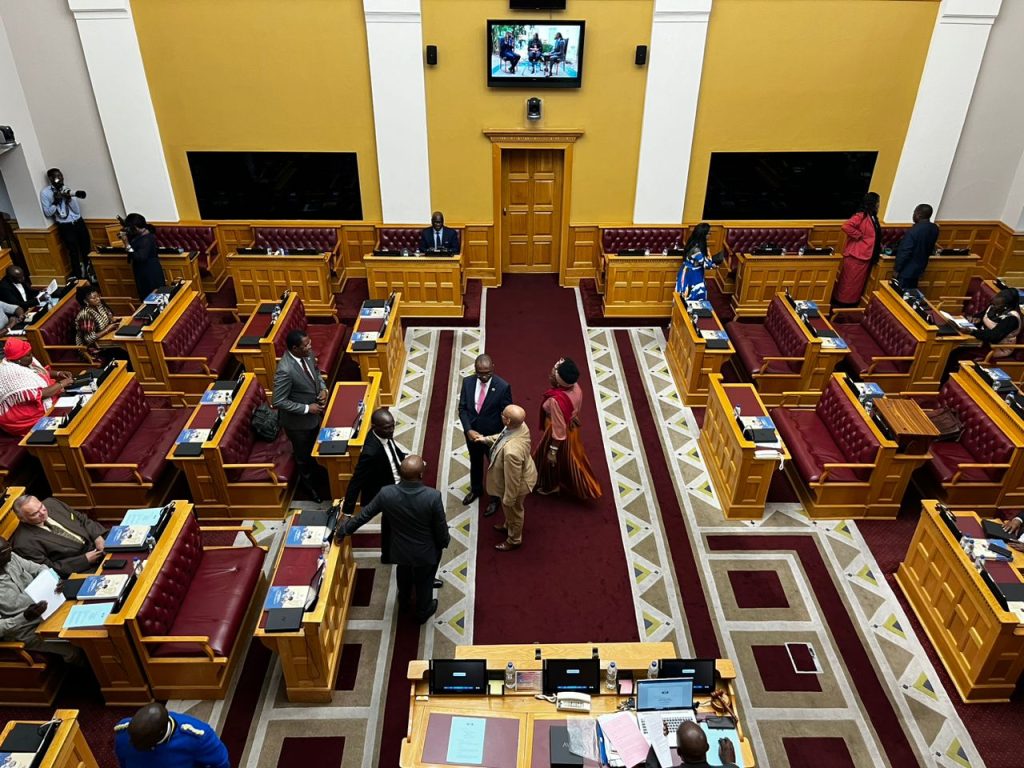
The National Assembly is filling up ahead of the budget announcement.
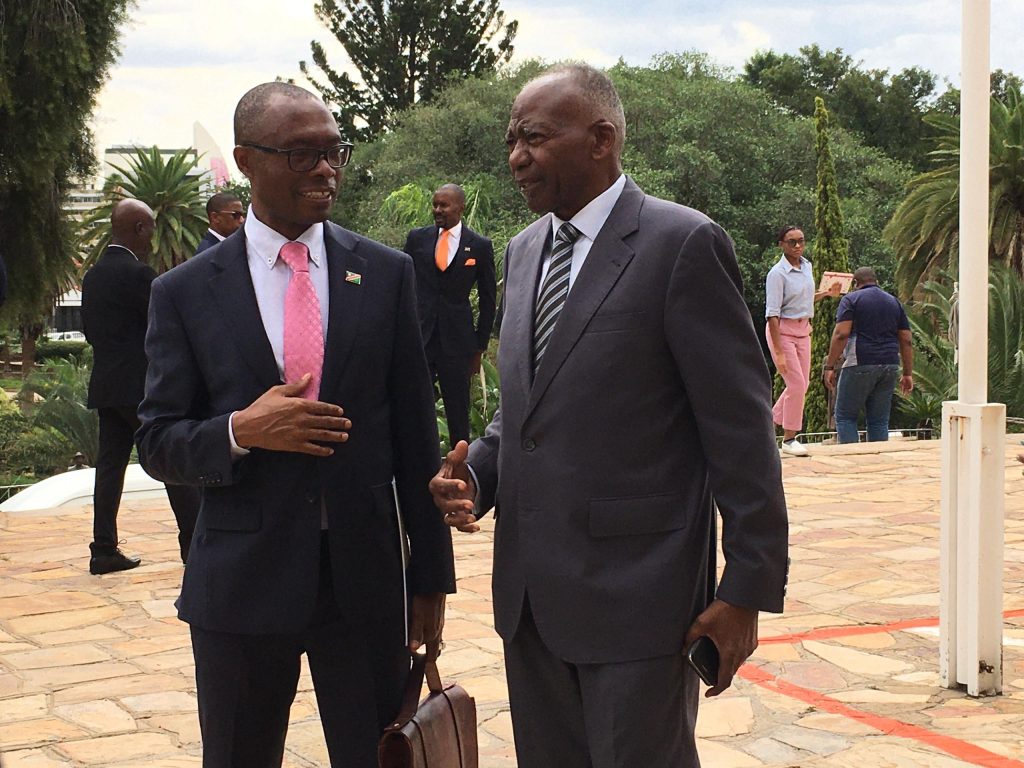
ARRIVAL … National Assembly speaker Peter Katjavivi and minister of finance and public enterprises Iipumbu Shiimi have arrived at parliament for the tabling of the 2024/25 national budget. Photo: Donald Matthys
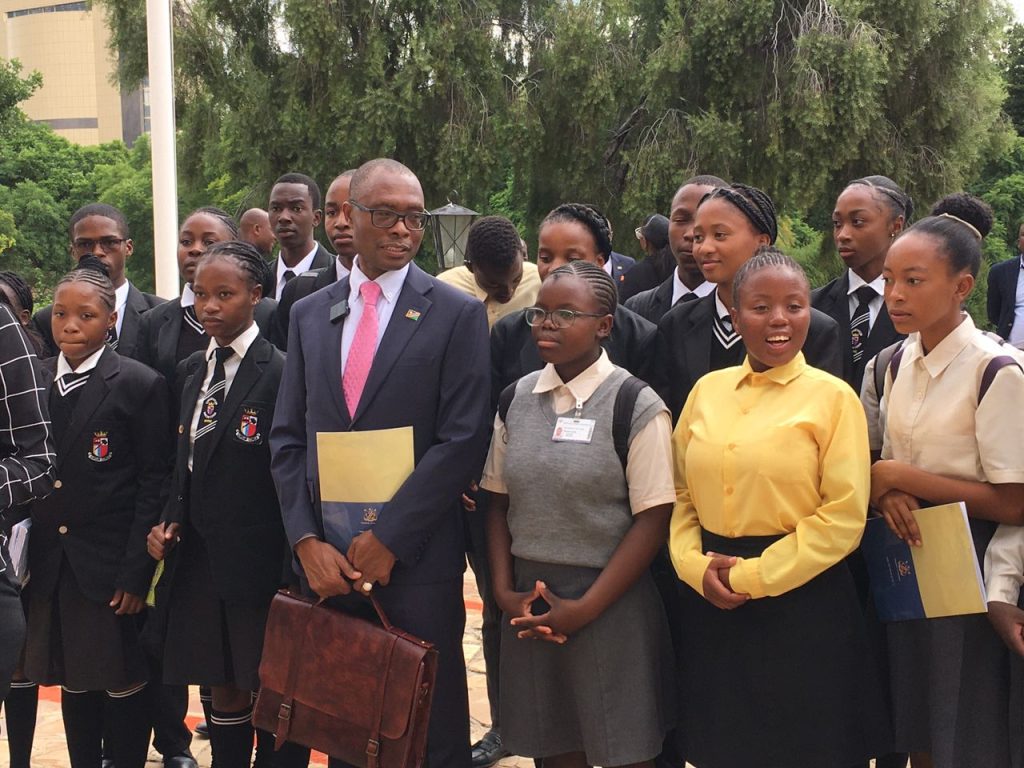
Minister of finance and public enterprises Iipumbu Shiimi has arrived at parliament to table the 2024/25 national budget. Shiimi says the budget will prioritise the social sector and offer taxpayers some relief.
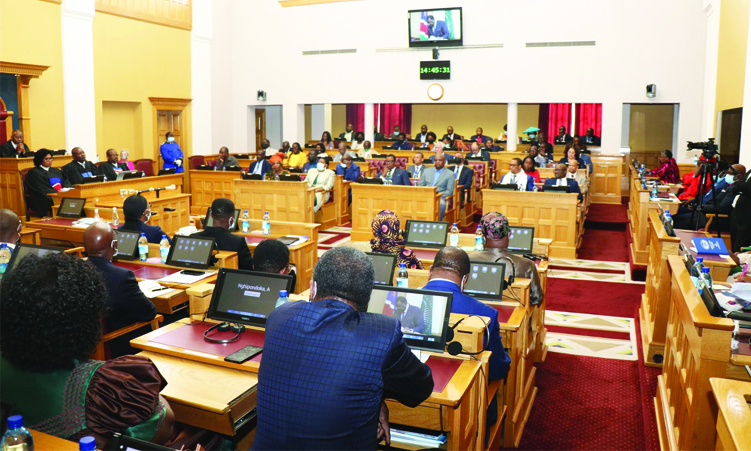
Good afternoon.
Big afternoon ahead as finance minister Iipumbu Shiimi is expected to deliver his 2024/25 budget speech at 14h30 in the National Assembly.
Stay with us as we take you through our blow-by-blow coverage right here.
We will also go live at parliament before and after Shiimi’s speech as we speak to parliamentarians and analysts, among others.
We will share the links here once we are live on our Facebook page.
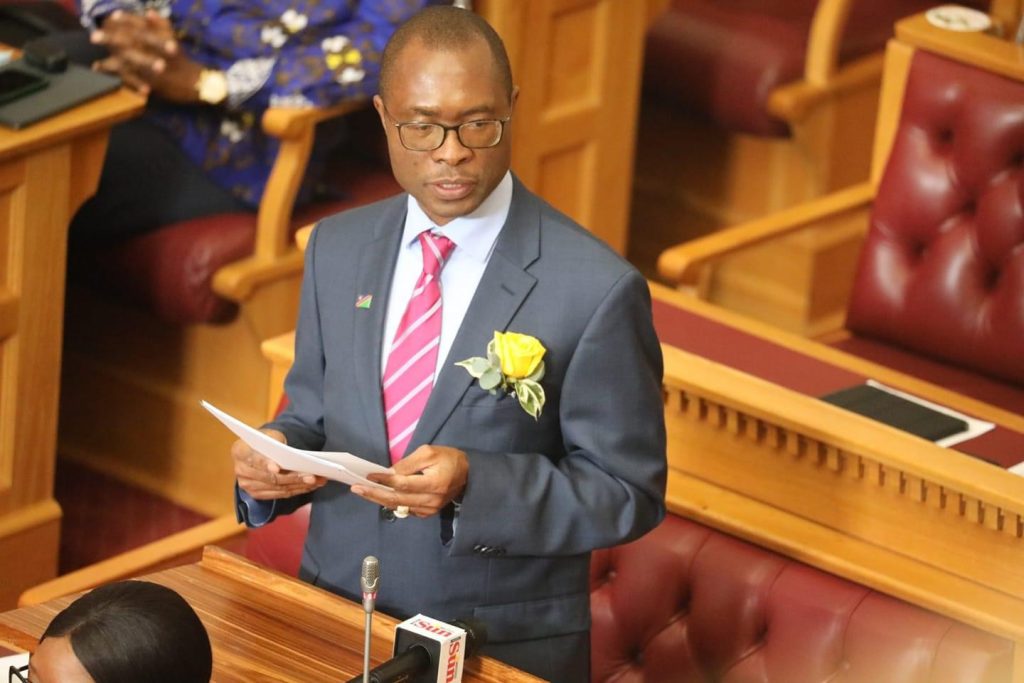
In the meantime, here is a look back at last year’s budget announcement:
These are some of the previews we have done so far in the run-up to today’s proceedings:
And here:
And here:
Here are some of your expectations for the budget according to your social media reactions:
Boston Tedd Swartbooi says the government must support the ministry of trade and industry. He says small and medium enterprises need business start-up capital or equipment from the government.
Frans Hikia Vansuide says the monthly old-age pension must be increased to N$3 000. He also wants new schools to be built countrywide to tackle the high rate of unemployed graduate teachers.
He further says the health sector needs to have artisans at all state hospitals to do maintenance.
Justina Absalom says he wants a N$3 400 monthly pension for the elderly and a N$1 350 child grant. “That’s the only reason why I’m still asking God why he took our president (Hage Geingob) early.”
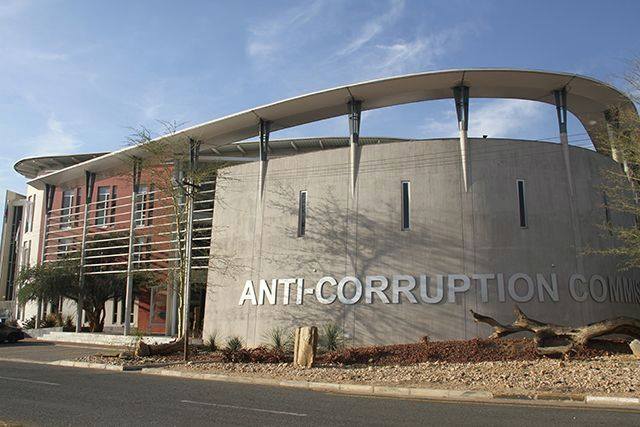
Klaas Swartbooi says the health ministry needs critical interventions. He also wants the budget of the Anti-Corruption Commission reduced. “It’s a joke, prioritise developmental initiatives.”
First_child06 says the health ministry needs enough beds, mattresses and linen for patients. “We don’t want to hear stories of no stock.”
Joaqina Domingo saysfunding should mostly be allocated to the ministries of education, health and agriculture. “Make agriculture meaningful by making use of our land by growing crops and focusing on meat products to allow employment.”
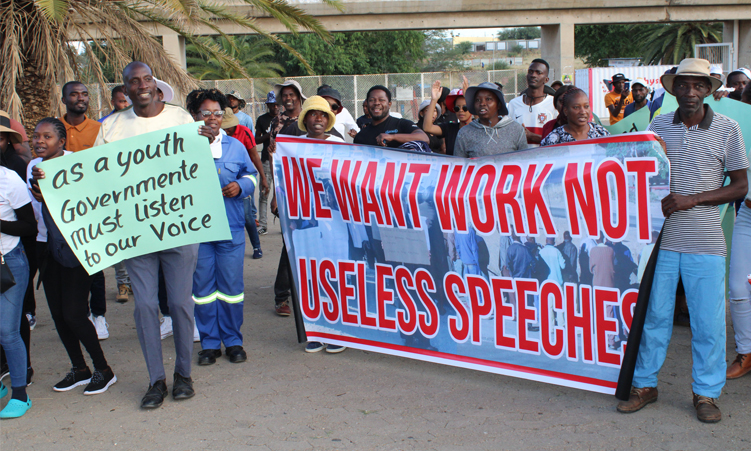
Justine Oaes says the focus should be on creating employment through sustainable projects, as prolonged hardships like unemployment and food scarcity contributes to mental health conditions like depression and anxiety.
Institute for Public Policy Research executive director Graham Hopwood says there is a need for accountability from various ministries on their spending.

He says there have been reports about wastage of funds.
Hopwood says each ministry should provide a public accountability report on where money is being spent so that they ensure it is being spent correctly.
Stay informed with The Namibian – your source for credible journalism. Get in-depth reporting and opinions for
only N$85 a month. Invest in journalism, invest in democracy –
Subscribe Now!





